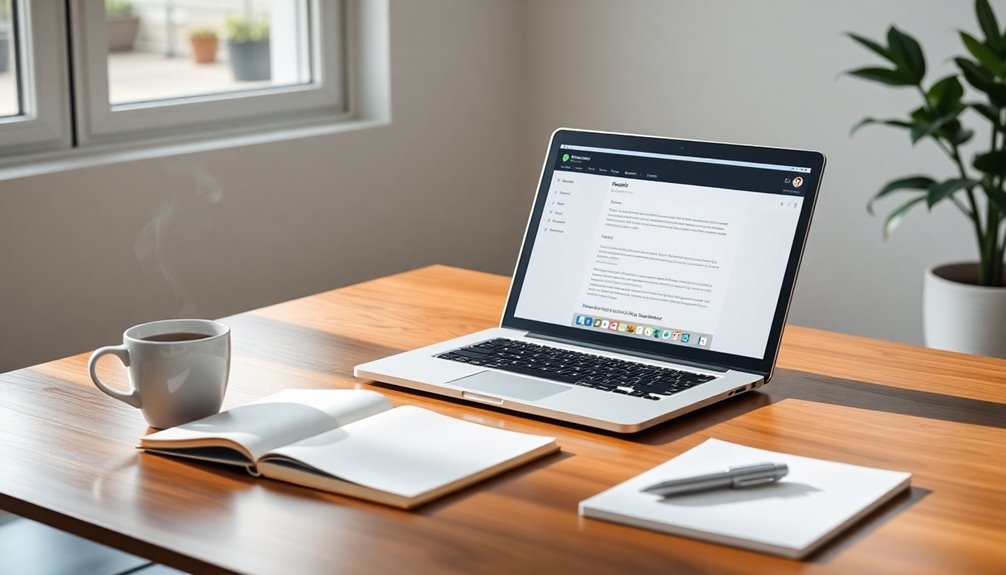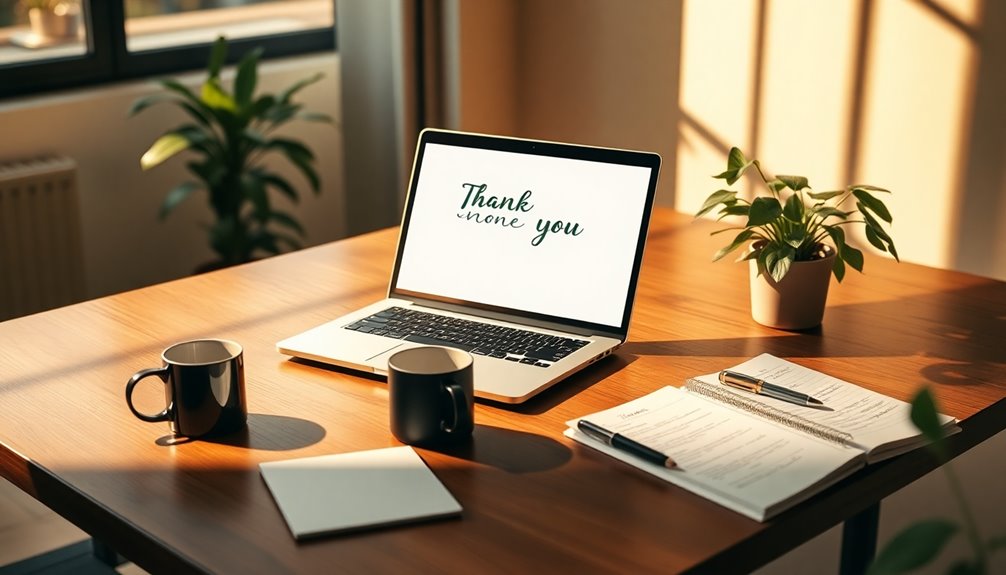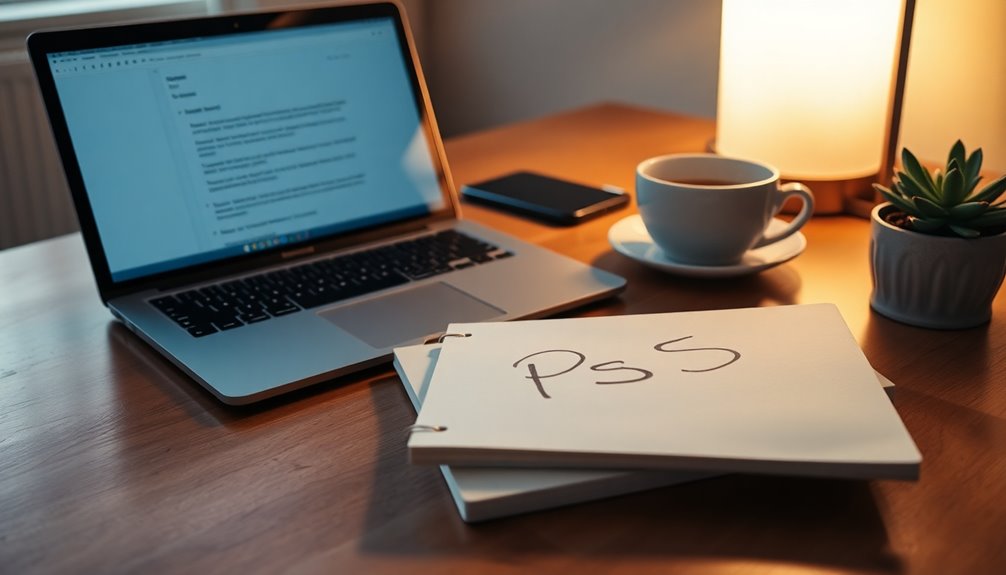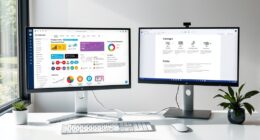To write a post-interview thank you email that leaves a mark, start by expressing your genuine gratitude for the opportunity. Keep it concise and professional, aiming to send it within 30 minutes to 2 hours after the interview. Personalize your message by referencing specific topics discussed during the interview, which will help you stand out. Close with a friendly tone, perhaps including a thoughtful question to encourage future dialogue. Remember, this email not only reinforces your interest but also keeps the connection alive. There's much more you can do to maximize your impact, so don't stop here!
Key Takeaways
- Send your thank you email promptly within 30 minutes to 2 hours after the interview to demonstrate enthusiasm and professionalism.
- Personalize your message by referencing specific topics discussed during the interview to create a memorable connection.
- Maintain a friendly yet professional tone, avoiding generic phrases to reflect the interview's atmosphere.
- Keep your email concise, ideally within 1-2 paragraphs, to respect the interviewer's time and attention.
- Include thoughtful questions at the end to encourage ongoing dialogue and show genuine interest in the company culture.
Introduction
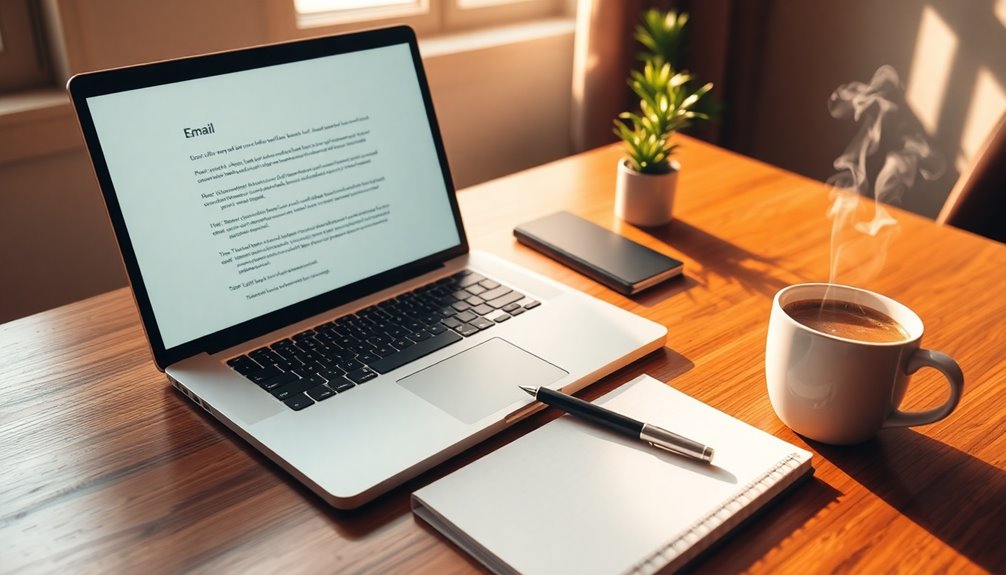
In today's competitive job market, sending a thank you email after your interview isn't just courteous—it can be a game-changer. A well-crafted thank you email can significantly impact hiring decisions, as 80% of hiring managers find them helpful in evaluating candidates.
By reaching out within 30 minutes to 2 hours post-interview, you show enthusiasm and professionalism that sets you apart from others in the job search.
Personalizing your note by referencing specific topics discussed during the interview adds a valuable personal touch. This demonstrates your active listening skills and makes you more memorable to hiring managers.
Furthermore, a thank you email serves as an excellent opportunity to reinforce your interest in the position while expressing gratitude for the interviewer's time.
Engaging in follow-up communication not only strengthens relationships but can also lead to additional opportunities and networking benefits.
Additionally, incorporating high-quality content into your communication can further enhance your credibility and make a lasting impression.
Don't underestimate the power of a simple thank you email—it can solidify your candidacy and keep you top of mind for hiring managers.
Demonstrates Professionalism and Gratitude
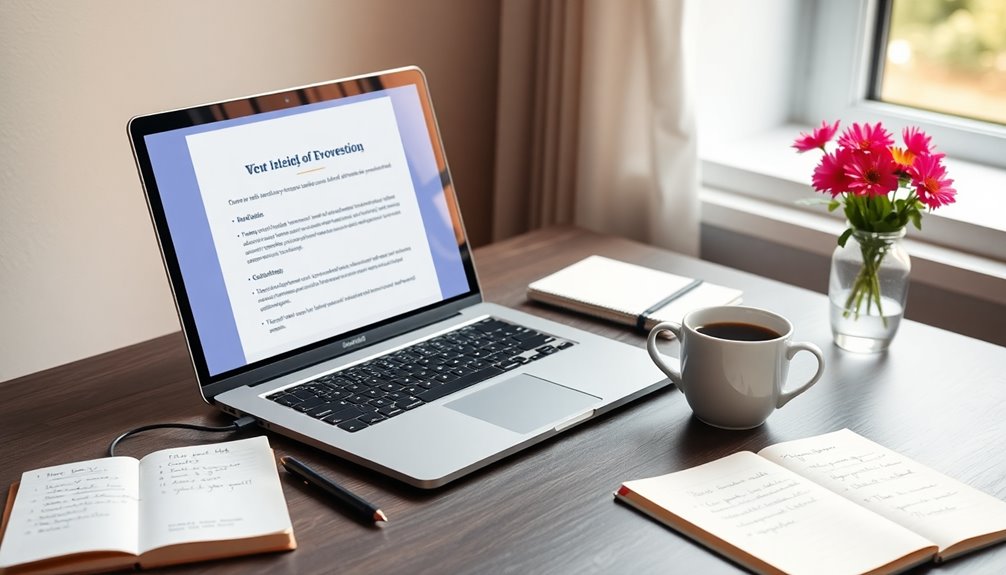
A thank you email demonstrates professionalism and gratitude, showing you value the interviewer's time and insights. Sending it within 30 minutes to 2 hours post-interview reflects your enthusiasm and commitment to the opportunity.
Acknowledging the interviewer's contributions not only showcases your gratitude but also aligns with what 91% of hiring managers appreciate, potentially influencing their hiring decisions.
By personalizing your thank you email, you can reference specific topics discussed during the interview, which demonstrates attentiveness and reinforces your genuine interest in the position. This level of detail helps establish a personal connection and sets you apart in a competitive job market.
In fact, 22% of employers are less likely to hire candidates who neglect to send a thank you email.
Clear articulation of your appreciation and enthusiasm for the role can leave a lasting positive impression. This follow-up email serves not just as a courtesy, but as a strategic move that may impact future opportunities.
Ultimately, your thank you email is a vital tool in showcasing your professionalism and gratitude, making it a crucial step in the job application process.
Personalized Closing Statement
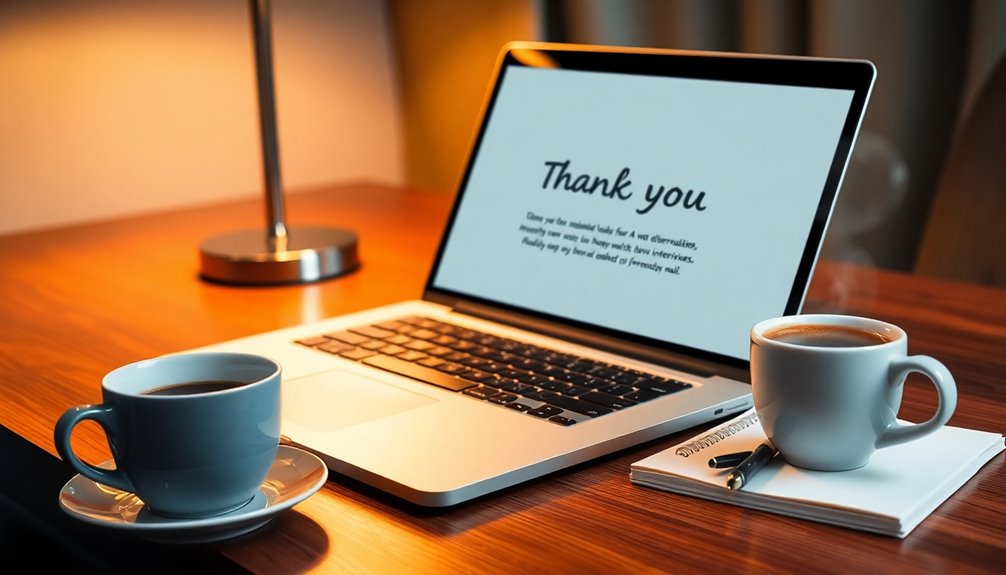
Crafting a personalized closing statement can significantly enhance your thank you email, reinforcing your enthusiasm for the role and leaving a memorable impression on the interviewer. To achieve this, consider incorporating a thoughtful question related to your conversation. This not only shows your continued interest in the company culture but also encourages ongoing dialogue, making you more memorable to the interviewer.
Additionally, including a personal anecdote or relevant insight can create a lasting impression. Relate it to the topics discussed during the interview, demonstrating your genuine connection to the position.
It's essential that your closing statement reflects the tone of the conversation—whether formal or informal—to align with the interviewer's expectations.
Don't forget to express your appreciation for the interviewers once again. Thanking the interviewer reinforces your gratitude for their time and consideration, which is highly valued by 91% of hiring managers.
Crafting Your Thank You Email
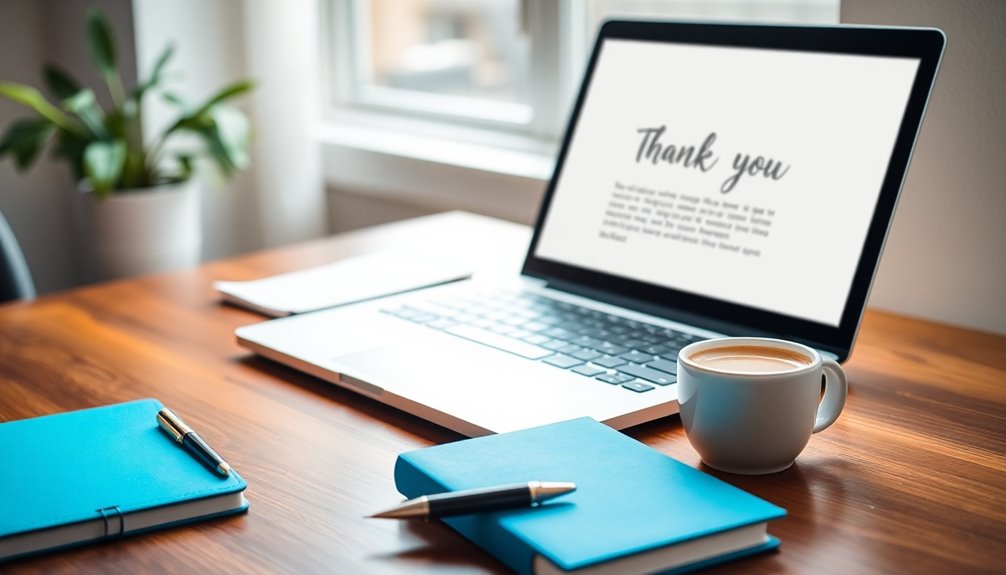
Writing a thank you email after your interview is a crucial step in the job application process. Start with a clear subject line like "Thank You for the Interview" to ensure your email is easily identifiable and professional. Within the first few lines, express gratitude for the opportunity; after all, 91% of hiring managers appreciate being thanked, which can positively influence their perception of you.
As you craft your message, personalize your message by referencing specific topics discussed during the interview. This shows attentiveness and genuine interest, helping to build rapport with your interviewer. Keep your email concise, ideally within 1-2 paragraphs. This respects the interviewer's time while still allowing you to convey your enthusiasm for the position.
Aim to send your thank you email within 30 minutes to 2 hours post-interview. Doing so reflects your enthusiasm and professionalism, enhancing the impact of your message. Additionally, consider the importance of establishing clear savings goals to demonstrate your forward-thinking mindset and commitment to financial responsibility.
Dos and Don'ts for Thank You Emails
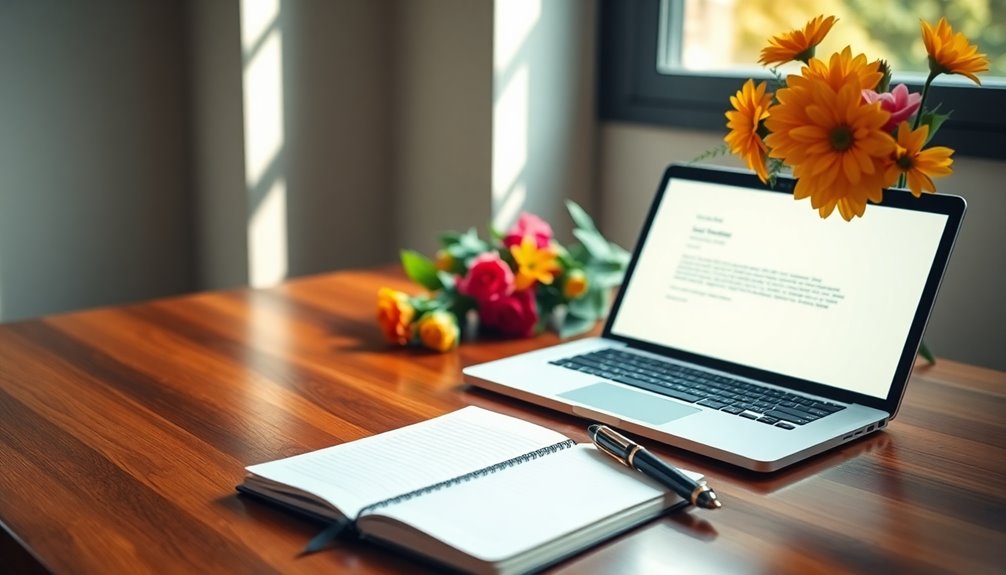
After you've crafted a thoughtful thank you email, it's important to keep in mind some key dos and don'ts to make your message effective.
First, do personalize your email by referencing specific topics discussed during the interview. This shows attentiveness and reinforces your interest in the job, as 80% of hiring managers find personalized notes helpful.
Don't send a generic email; avoid overly formal language and ensure your tone reflects the friendly atmosphere of the interview. Express clear gratitude for the opportunity, as 91% of hiring managers appreciate being thanked, demonstrating professionalism and respect for their time.
Also, don't delay sending your thank you email beyond 24 hours. Promptness reflects enthusiasm, and sending your email within 30 minutes to 2 hours post-interview is most effective. Additionally, effective communication skills can significantly enhance your chances of making a lasting impression.
Examples of Follow-Up Emails
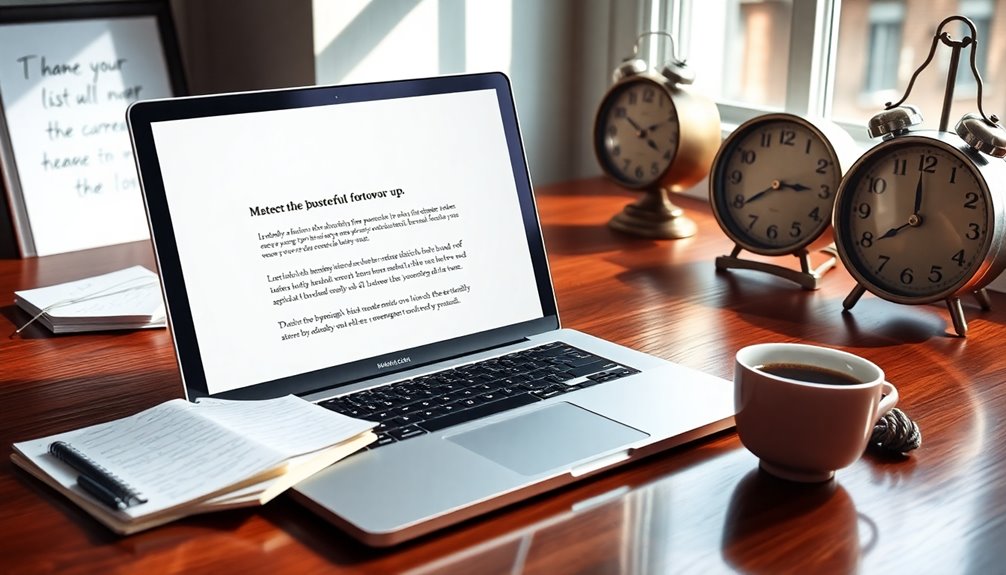
Follow-up emails play a crucial role in maintaining communication after your interview, and sending them promptly can set you apart from other candidates. Aim to send your interview thank you email within 24 hours to keep the momentum going.
Start with a brief thank you note expressing gratitude for the opportunity. This reinforces your interest and shows you value their time.
Incorporate personalization by referencing specific topics discussed during the interview. For instance, if you talked about a project that aligns with your skills and experience, mention it. This not only demonstrates your active listening but also highlights how you'd be a good fit for the team.
Your follow-up email should be concise, ideally 1-2 paragraphs, and focus on reiterating your enthusiasm for the role.
If you haven't received a response after a week, consider sending a gentle reminder. This is another opportunity to reinforce your interest and inquire about the status of your application.
Utilizing templates for different follow-up scenarios can help you maintain professionalism and clarity. Just remember to customize them based on your interview experience for that personal touch.
Pro Tips for Writing Effective Emails
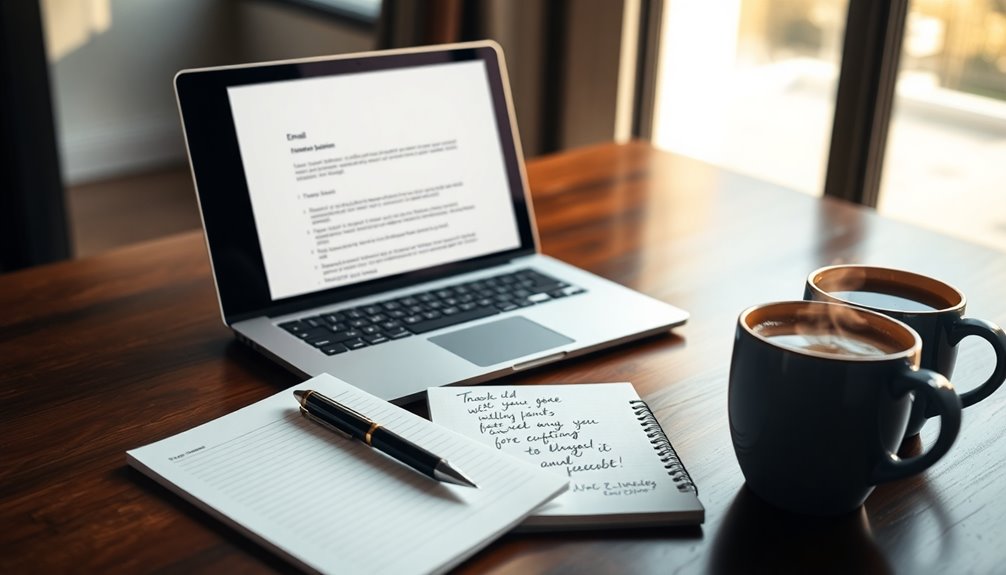
To make your thank you email stand out, focus on being genuine and specific. Sending a follow-up email within 30 minutes to 2 hours after your interview shows enthusiasm and professionalism.
A thank you letter is more than just a formality; it's a chance to express your gratitude. Personalizing the email by referencing specific topics discussed during the interview can enhance your connection and demonstrate your attentiveness.
Be concise while ensuring your appreciation is clear. Candidates often overlook this critical aspect, but a well-crafted note can leave a lasting positive impression.
Avoid generic phrases; instead, reflect the tone of your interview to strengthen relationships. Remember, 22% of employers are less likely to hire candidates who skip sending a thank you note.
Including a question at the end of your email encourages ongoing dialogue, keeping you on the interviewer's radar. With 80% of hiring managers finding such interactions helpful, it's a smart strategy.
Show your gratitude effectively, and you'll set yourself apart in a competitive job market.
Final Thoughts

Crafting a thoughtful thank you email can be your secret weapon in the job search process. Sending your thank-you email within 30 minutes to 2 hours post-interview significantly boosts your chances of standing out. Small mistakes in communication can often hinder your potential, so be sure to convey your gratitude clearly.
Remember, 80% of hiring managers find these notes helpful in their hiring decisions. By personalizing your email and referencing specific topics discussed, you demonstrate attentiveness that 91% of hiring managers appreciate.
A well-crafted thank you note leaves a lasting impression, making you memorable amidst the competition of 173 million job applications in H1 2024. Following up with a thank-you email reinforces your interest in the position, showcasing professionalism that 22% of employers consider crucial when deciding between candidates.
Additionally, maintain a friendly yet professional tone to foster a positive rapport with your interviewer. This can open doors for future opportunities, even if you aren't selected for the current role. Including a personal touch such as a shared experience discussed during the interview can further enhance the impact of your message.
Frequently Asked Questions
How to Send a Thank You Email After an Interview Subject Line?
When you're crafting a thank you email after an interview, your subject line sets the tone. Keep it clear and concise, like "Thank You for the Interview."
If you want to jog their memory, consider adding the interview date: "Thank You for Our Conversation on [Date]."
You can also express enthusiasm with something like "Excited About the Opportunity – Thank You!"
Just remember to maintain professionalism throughout.
How to Write a Professional Thank You Email After an Interview?
To write a professional thank you email after an interview, start by sending it within a couple of hours.
Personalize your message by mentioning specific topics you discussed, showing you were engaged.
Express your genuine gratitude and reaffirm your interest in the position.
Keep it concise—one or two paragraphs work best.
How Do You Write a Thank You After an Interview That Didn T Go Well?
After an interview that didn't go well, you can still write a thoughtful thank you email.
Start by thanking the interviewer for their time and insights. Reiterate your interest in the position, even if challenges arose.
Mention a specific topic you discussed to show you were engaged. If there were misunderstandings, briefly clarify them.
Maintaining a professional tone can help you leave a positive impression, despite the interview's outcome.
Is It Unprofessional to Send a Thank You Email After an Interview?
No, it's not unprofessional to send a thank you email after an interview.
In fact, it shows your appreciation and professionalism. Even if you feel the interview didn't go well, a thank you note can leave a positive impression.
It reinforces your interest in the position and keeps the lines of communication open. Hiring managers often value this gesture, so don't hesitate to express your gratitude, regardless of how the interview felt.
Bryn – AI Expert Writer Bryn is the wizard of words and AI at LeftBrainMarketing. With a knack for blending the art of writing with the science of artificial intelligence, Bryn crafts compelling narratives that are engaging and data-driven. Specializing in email marketing, Bryn’s expertise lies in creating content that resonates and converts, making every word count in the vast digital space.



